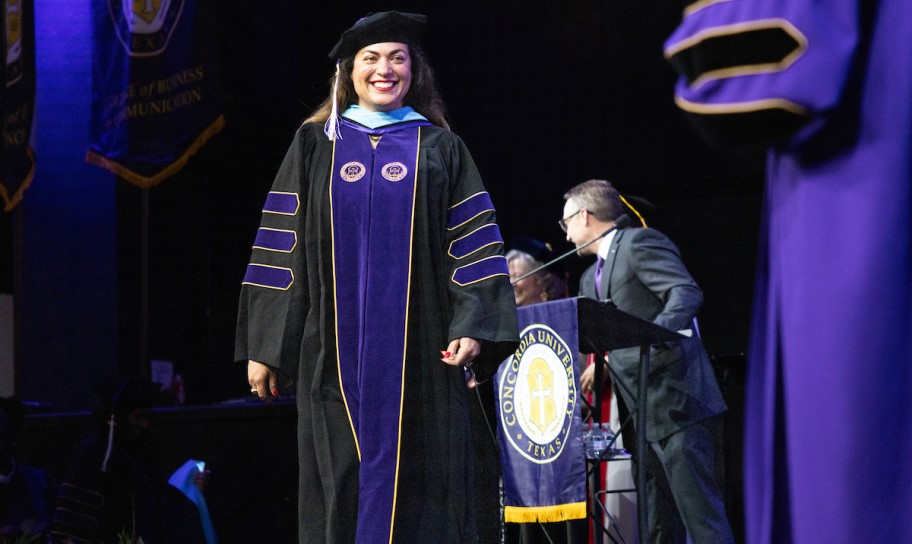Become a Thoughtful Leader in Education Through Empowerment
Concordia University Texas’s Doctor of Education (EdD) program prepares experienced educators and organizational leaders to lead with purpose, anticipate challenges, and drive meaningful change. You’ll strengthen your ability to ask better questions, evaluate research, and apply what you learn to real-world leadership needs—so you can empower students and staff to thrive in schools, districts, and learning organizations.
Earn your EdD in a structured cohort experience designed for working professionals.
A Flexible, Cohort-Based Path to Your EdD
Designed for busy professionals, the Concordia Texas EdD blends online coursework with two immersive, on-campus residency weeks—giving you the flexibility of distance learning and the connection of in-person collaboration.

Online Coursework with Two Summer Residencies
Complete your coursework online while building relationships through two required, weeklong summer residencies on Concordia’s campus in Austin.

Collaborative Cohort Model
Move through the program with a small cohort (typically 10–12 students). You’ll gain support, accountability, and a peer learning community that helps you stay on track from start to finish.
Three-Year Timeline
2 Weeklong Residencies
No GRE Required

Two Specializations Designed for Leadership Impact
Every leadership path is different—so your EdD should match your goals. Choose one of two specializations to tailor your doctorate to the work you feel called to do.
EdD Admission Requirements
Our admissions process is designed to be clear and supportive. You’ll work directly with an admissions counselor who will guide you through each step of your application.
Step 1: Complete Your Application
Complete your online application through our admissions portal.
Step 2: Submit Required Documents
Submit required materials, including official transcripts, resume/CV, employer support form or letter, three letters of reference, letter of intent, and a sample of scholarly writing.
Step 3: Connect with Your Admission Counselor
Your admissions counselor will review your file, confirm next steps, and help you move toward enrollment.
EdD Program Cost
Earning your EdD is an investment in your leadership—and Concordia Texas is committed to keeping that investment predictable. Our tuition and fees are straightforward, with no hidden costs, so you can plan confidently as you take the next step in your career.
Advance your career without pausing your life. Apply today to secure your spot in our upcoming start.
Apply TodayEdD Career Outcomes
Graduates from our EdD program pursue roles such as:
- School District Leaders
- Superintendent
- Higher Education Professor
- Chief Learning Officer
- Educational Consultant
- University Administrator


I love having the opportunity to assist students in developing research projects that not only help their immediate context, but that may also work to aid students across districts and regions. That is one commonality that I have seen with the CTX EdD students. They all want to make a difference.
Dr. Stephanie HartzellDirector of the Doctor of Education ProgramGain the skills, confidence, and connections to move your career forward.
Doctor of Education (EdD) Frequently Asked Questions (FAQ)
-
Do I need to take the GRE?
No. Concordia Texas does not require GRE scores for admission to the EdD program.
-
How long does it take to earn my degree?
Concordia Texas’s EdD program can be completed in three years.
-
Is the EdD program available fully online?
The program is primarily online, with two required weeklong summer residencies on campus in Austin.
-
What concentrations are available?
Students can tailor their EdD with concentrations in:
- Educational Leadership
- Curriculum & Instruction
-
Do I have to write a dissertation?
Students can complete a traditional dissertation or choose the Culminating Research-based Inquiry of Practice (CRIP) option, designed for research-based solutions in real-world contexts.
-
When can I start the EdD program?
Concordia Texas offers start dates in our EdD program each summer with our next start date in Summer 2026.
Reach out to our Admissions team to get stated.
-
Can the EdD lead to Superintendent Certification?
Educational Leadership students may pursue optional Texas Superintendent Certification, subject to eligibility requirements and Texas Education Agency regulations.
-
What type of courses will I take in the EdD program?
In Concordia Texas’s Doctor of Education (EdD) program, you’ll take a mix of core doctoral leadership + research courses, followed by specialization courses in your chosen track, and then finish with a practicum plus a Dissertation or CRIP project.
Check out the full list of courses offered in the EdD program here.
-
How do I apply to the EdD program?
Applying to the EdD program at Concordia University Texas is simple.
- Complete an online application
- Submit your professional resume
- Provide your transcripts from previous institutions
- Submit your letters of recommendation and employer support form
- Submit a sample of scholarly writing
-
Is the EdD program accredited?
Yes. Concordia University Texas is regionally accredited by the Southern Association of Colleges and Schools Commission on Colleges (SACSCOC) to award the Doctorate in Education, which covers the EdD program.
-
Is an EdD from Concordia University Texas worth the investment?
Absolutely. Concordia Texas’s EdD is designed to deliver a strong return on investment by helping you advance as an education leader, apply research to real challenges, and lead with confidence.


